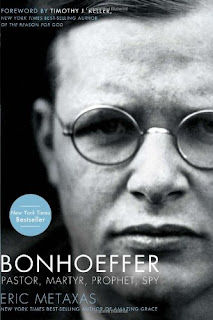I've been thinking a lot lately about what it means to live faithful lives "in the world." Wendell Berry writes a lot about loving and serving the world by loving and serving the place that you are. Berry tends to emphasize themes of local economy as well as presence and affection for a people and a place. Also, not too long ago, I finished reading Eugene Peterson's memoirs
The Pastor and was struck by Peterson's vision for pastoral ministry, to be personal, present and local with a people. John Stott is famously known for saying that we ought not to blame a dark room for being dark, rather ask, "where's the light?" We shouldn't blame meat for having gone bad, rather ask, "where's the salt?" Our general lack of teaching the central importance of "vocational presence" in all of life leaves the Church implicated wherever we find "the world being the world." What does it mean to live faithful lives in the world? I was re-reading one of my favorite books, I believe for the Church, one of the more important books to come out in a long time. I find myself asking again the shape of faithfulness to God's work in the world. Here's Hunter's answer. Listen to his robust, beautiful and powerful vision of "faithful presence":
I would suggest a
theology of faithful presence first calls Christians to attend to the people
and places that they experience directly. It is not that believers should be
disconnected from, or avoid responsibility for, people and places across the
globe. Far from it. Christians are called to “go into all the world,” after all
and to carry the good news in word and deed that God’s kingdom has come. But
with that said, the call of faithful presence gives priority to what is right
in front of us–the community, the neighborhood, and the city, and the people
of which these are constituted. For most, this will mean a preference for stability,
locality, and particularity of place and its needs. It is here, through the
joys, sufferings, hopes, disappointments, concerns, desires, and worries of the
people with whom we are in long-term and close relation–family, neighbors,
coworkers, and community–where we find our authenticity as a body and as
believers. It is here where we learn forgiveness and humility, practice
kindness, hospitality, and charity, grow in patience and wisdom, and become
clothed in compassion, gentleness, and joy. This is the crucible within which
Christian holiness is forged. This is the context within which shalom is
enacted.
In our tasks, the
call of faithful presence implies a certain modesty that gives priority to
substance over style; the enduring over the ephemeral, depth over breadth, and
quality, skill, and excellence over slick packaging or “high production values.”
It would encourage ambition, but the instrumentalities of ambition are always
subservient to the requirements of humility and charity.
Even if our tasks
in the world do not have “ultimate significance,” that does not mean that the
tasks we perform have no spiritual significance. To be sure, sin pervades work
and, in our own day, capitalism transforms the nature of work in ways that can
be profoundly dehumanizing. But this does not negate the dignity that comes from
tasks well done or the good done for neighbor and stranger alike. Indeed, when
our various tasks are done in ways that acknowledge God, God is present and he
is glorified. Such tasks may not be redeeming, but they can provide a foretaste
of the coming kingdom. What can be said of tasks generally can be said, for
example, about specific professions. To manage a business in a way that grows
out of a biblical view of relationships, community, and human dignity before
God has divine significance, irrespective of what else might be done from this
platform. Policy pursued and law practiced in light of the justice of God is a
witness to the right ordering of human affairs. Inquiry, scholarship, and
learning with an awareness of the goodness of God’s created order is a
discovery of what is truly higher in higher education. And, not least,
reflecting the beauty of God’s creation in art or music is nothing less than an
act of worship. In short, fidelity to the highest practices of vocation before
God is consecrated and itself transformational in its effects.
As to our spheres
of influence, a theology of faithful presence obligates us to do what we are
able, under the sovereignty of God, to shape the patterns of life and work and
relationship–that is, the institutions of which our lives are
constituted–toward a shalom that seeks the welfare not only of those of the
household of God but of all. That power will be wielded is inevitable. But the means of influence and the ends of influence must conform to the
exercise of power modeled by Christ.
Thus, when the
Word of life is enacted within the whole body of Christ in all its members
through an engagement that is individual, corporate, and institutional, not
only does the word become flesh, but an entire lexicon and grammar becomes
flesh in a living narrative that unfolds in the body of Christ; a narrative
that points to God’s redemptive purposes. It is authentic because it is enacted
and finally persuasive because it reflects and reveals the shalom of God.
To Change the World, pp. 253-4

.jpg)

